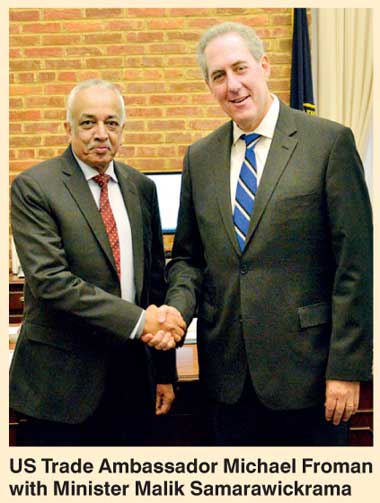Friday Feb 27, 2026
Friday Feb 27, 2026
Tuesday, 3 May 2016 00:04 - - {{hitsCtrl.values.hits}}
With the Joint Action Plan that was announced last week, the US said it hopes to set forth a series of concrete and specific initiatives to strengthen Sri Lanka’s trade and investment regime and mobilize more of the Sri Lankan population to participate in a trade-oriented economy. This was conveyed by US Trade Representative Ambassador Michael Froman during talks with Sri Lanka delegation in Washington last week. Following are excerpts from Froman's speech at the 12th Joint Council Meeting under the US-Lanka Trade and Investment Framework Agreement:
Good morning. First of all, let me welcome you, Minister Samarawickrama, and your delegation to USTR during this watershed  moment in the history of our bilateral relations. While this is the twelfth meeting of the US-Sri Lanka Trade and Investment Framework Agreement Council, it is our first significant opportunity for engagement on trade and investment issues since the Sri Lankan presidential election last year. That election marked the start of a new era in Sri Lankan history and presented an opportunity for renewed US diplomatic engagement to support democracy, the rule of law, reconciliation, and shared prosperity.
moment in the history of our bilateral relations. While this is the twelfth meeting of the US-Sri Lanka Trade and Investment Framework Agreement Council, it is our first significant opportunity for engagement on trade and investment issues since the Sri Lankan presidential election last year. That election marked the start of a new era in Sri Lankan history and presented an opportunity for renewed US diplomatic engagement to support democracy, the rule of law, reconciliation, and shared prosperity.
Our commitment to helping Sri Lanka in those areas extends to the very highest level. You can see it in President Obama’s meeting with President Sirisena on the margins of the UN General Assembly last year. You can see it in Secretary Kerry’s announcement of a $40 million development assistance plan. And you can see it in Ambassador Power’s presence here today, and in her collaboration with your government on geo-political issues of regional and bilateral importance every day.
We began to discuss our plans for further economic and development engagement during the first annual U.S.-Sri Lanka Partnership Dialogue, here in Washington, just a few months ago. Our countries already have a solid economic relationship. For example, the Sri Lankan garment industry exports more products to the United States than to any other market. But we all agree that our economic relations have far greater potential. And today we’re demonstrating that trade and investment policy based on respect for workers and the environment is the right thing to do – both morally and economically. Done right, trade policy advances both our interests and our values.
With the Joint Action Plan that we will announce, we hope to set forth a series of concrete and specific initiatives to strengthen Sri Lanka’s trade and investment regime and mobilise more of the Sri Lankan population to participate in a trade-oriented economy.
We believe that this Action Plan, if fully implemented, will improve the competitiveness of key industries; promote new industries through innovation, and fully leverage Sri Lanka’s geographic strengths as a crossroads for commerce. Furthermore, we believe that this comprehensive reform will create vastly greater opportunities for US exporters and investors. Sri Lanka already boasts one of the region's most educated workforces, and the Action Plan will capitalize on this by promoting the economic contributions of women in the economy, as well as generating employment and higher living standards for the people of Sri Lanka.
We agree with the Sri Lankan Government’s assessment that there is an unmet demand in South Asia for a regional services hub, and with the right policies in place, we believe Sri Lanka could meet that demand. But Sri Lanka will have to make it much easier to move goods and services into and out of the country to make that dream a reality.
With that in mind, I encourage Sri Lanka to ratify the WTO Trade Facilitation Agreement (TFA). The TFA will help Sri Lanka plug into global supply chains and enhance integration with its neighbours. Upon ratification, Sri Lanka will be eligible to request assistance from the Global Alliance for Trade Facilitation, which can provide assistance to implement and take advantage of the benefits the Trade Facilitation Agreement provides. The United States has made available $40 million to the Global Alliance’s pool of funds, and I would like to see Sri Lanka apply to make use of some of those resources.
We are also seeking to promote bilateral trade and investment flows through additional development assistance. The US legislative mandate against supporting Sri Lankan projects at international financial institutions has been lifted, and the US voted in favour of a recent project at the Asian Development Bank, which will deliver $100 million to Small and Medium Enterprises in Sri Lanka.
The U.S. Departments of Commerce and Treasury, USAID, and others represented here today are helping your government improve the commercial law environment, attract Foreign Direct Investment, implement training programs for key economic sectors, and provide technical assistance for public financial management. Today, we’ll discuss additional potential programs to provide financial assistance, training, and market access to some of the most vulnerable segments of Sri Lankan society. I understand the Sri Lankan Government has suggested some specific initiatives for collaboration under the Joint Action Plan, and we look forward to discussing these and other ideas as we develop its implementation plan. We can use the next few hours to identify the agenda and priorities that will drive our work over the coming months. In the spirit of making the most of our time today, I’ll end my remarks there.
Thank you.